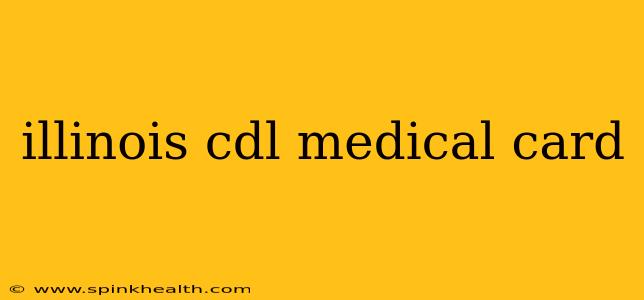The rumble of the engine, the open road stretching ahead – the life of a truck driver is a powerful draw for many. But before you can hit the highway hauling freight across Illinois, there's a crucial first step: obtaining your Commercial Driver's License (CDL) medical card. This isn't just a formality; it's a vital piece of the puzzle ensuring your safety and the safety of others on the road. My journey to get my Illinois CDL medical card wasn't always smooth sailing, but it taught me a lot, and I'm sharing my story to help you navigate this process.
Let's start with the basics. The Illinois CDL medical card certification process isn't a simple "walk-in, walk-out" affair. It requires careful planning and preparation. Think of it as a thorough health check, designed to ensure you're physically and mentally fit to operate a commercial vehicle.
What are the Illinois CDL Medical Card Requirements?
This is where the real journey begins. The requirements for an Illinois CDL medical card are fairly stringent, and meeting them is paramount. The Federal Motor Carrier Safety Administration (FMCSA) sets the standards, which are then implemented by states like Illinois. These standards ensure that drivers are capable of performing their duties safely. Here's a breakdown of some key areas:
Vision Requirements for Illinois CDL Medical Cards:
This is often the first hurdle for many aspiring drivers. You'll need to meet specific vision standards, including visual acuity, field of vision, and color vision. Don't underestimate this; poor vision can be a major safety hazard. I know a fellow driver who struggled with this initially, but with corrective lenses, he easily met the requirements.
Hearing Requirements for Illinois CDL Medical Cards:
Your hearing will also be assessed. You must be able to hear conversational speech at a normal speaking voice. Think of emergency situations – clear hearing is essential for reacting appropriately.
Physical Examinations for Illinois CDL Medical Cards:
The physical examination is comprehensive. It assesses your overall health, looking for conditions that could impact your ability to drive safely. This includes things like blood pressure, cardiovascular health, and more. Be prepared to answer questions honestly and provide any relevant medical information.
How Long Does it Take to Get an Illinois CDL Medical Card?
The processing time varies. It depends on how quickly you schedule your physical, how quickly your doctor submits the paperwork, and how quickly the Illinois Secretary of State processes your application. Plan ahead; don't leave this until the last minute. Allow yourself sufficient time to complete the process without unnecessary stress.
How Much Does an Illinois CDL Medical Card Cost?
The cost is mainly associated with the medical examination itself. The fee varies from doctor to doctor, so it's wise to check beforehand. The Illinois Secretary of State does not charge a separate fee for processing the medical certification once it's submitted by your medical examiner.
Where Can I Get a CDL Medical Card in Illinois?
You'll need to visit a medical examiner registered with the FMCSA. The Illinois Secretary of State's website usually has a list of certified examiners in your area. Choosing a provider experienced in CDL medical certifications is a smart move. They will be familiar with the specific requirements and can guide you through the process effectively.
Can I Renew My Illinois CDL Medical Card?
Yes, CDL medical cards are not permanent. They typically require renewal every 1, 2, or 4 years depending on the recommendations of your medical examiner. This ensures your ongoing fitness to operate a commercial vehicle.
What Happens if I Don't Meet the Requirements?
If you don't meet the requirements, you won't be issued a medical card. Don't despair; this doesn't necessarily mean the end of your trucking dreams. Talk to your doctor; they might be able to suggest ways to improve your health and meet the requirements in the future.
My journey to obtain my Illinois CDL medical card wasn't just about paperwork and examinations; it was a reminder of the responsibility that comes with driving a commercial vehicle. It's a commitment to safety, both for myself and for everyone else on the road. I hope my experience helps you on your own journey. Remember to be prepared, be honest, and be proactive. The open road awaits!

